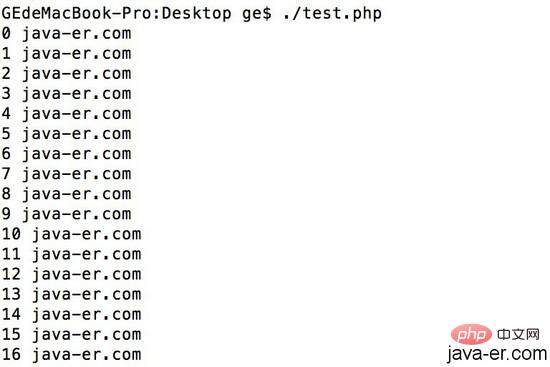ホームページ >バックエンド開発 >PHPチュートリアル >phpコマンドライン記述シェル例の詳細説明
phpコマンドライン記述シェル例の詳細説明
- coldplay.xixi転載
- 2020-08-24 16:45:522885ブラウズ

[関連する学習の推奨事項: php グラフィック チュートリアル]
php は Java Perl Python のように実行できます。今日、これを知っていればということがわかりました。以前は Java と Python は学ばないかもしれません。
当時 Java はサーバーにプログラムを置くためだけに勉強して、ずっと動かし続けていましたが、php も使えることが分かりました。
php -h
Usage: php [options] [-f] <file> [--] [args...]
php [options] -r <code> [--] [args...]
php [options] [-B <begin_code>] -R <code> [-E <end_code>] [--] [args...]
php [options] [-B <begin_code>] -F <file> [-E <end_code>] [--] [args...]
php [options] -S <addr>:<port> [-t docroot] [router]
php [options] -- [args...]
php [options] -a
-a Run as interactive shell
-c <path>|<file> Look for php.ini file in this directory
-n No configuration (ini) files will be used
-d foo[=bar] Define INI entry foo with value 'bar'
-e Generate extended information for debugger/profiler
-f <file> Parse and execute <file>.
-h This help
-i PHP information
-l Syntax check only (lint)
-m Show compiled in modules
-r <code> Run PHP <code> without using script tags <?..?>
-B <begin_code> Run PHP <begin_code> before processing input lines
-R <code> Run PHP <code> for every input line
-F <file> Parse and execute <file> for every input line
-E <end_code> Run PHP <end_code> after processing all input lines
-H Hide any passed arguments from external tools.
-S <addr>:<port> Run with built-in web server.
-t <docroot> Specify document root <docroot> for built-in web server.
-s Output HTML syntax highlighted source.
-v Version number
-w Output source with stripped comments and whitespace.
-z <file> Load Zend extension <file>.
args... Arguments passed to script. Use -- args when first argument
starts with - or script is read from stdin
--ini Show configuration file names
--rf <name> Show information about function <name>.
--rc <name> Show information about class <name>.
--re <name> Show information about extension <name>.
--rz <name> Show information about Zend extension <name>.
--ri <name> Show configuration for extension <name>.1. php コマンド ラインを使用して、/usr/bin/php test.php
abbreviationphp test.php## などの php スクリプトを実行します。
<?php
for($i=0;$i<10;$i++){
echo $i;
echo '\n';
}
?>2. スクリプトの先頭の 1 行目に #!/usr/bin/php と記述すると、スクリプト実行可能ファイル chmod a x test.php を作成できます。次に、コマンド ラインを使用できます。スクリプトを直接実行します (例:/test.php#!/usr/bin/php
<?php
for($i=0;$i<10;$i++){
echo $i;
echo " java-er.com \n";
}
?>1 時間実行して、php がハングするかどうかを確認します。コマンド ラインが永遠に実行できることを願っています#!/usr/bin/php
<?php
for($i=0;$i<360;$i++){
echo $i;
sleep(10);
echo " java-er.com \n";
}
?>)

#!/usr/bin/php
<?php
var_dump($argc); //返回参数总个数
var_dump($argv);
exit;
?>
./test.php
int(1)
array(1) {
[0]=>
string(10) "./test.php"
}
./test.php a java php
int(4)
array(4) {
[0]=>
string(10) "./test.php"
[1]=>
string(1) "a"
[2]=>
string(4) "java"
[3]=>
string(3) "php"
}
関連学習の推奨事項:php プログラミング (ビデオ)
# #
以上がphpコマンドライン記述シェル例の詳細説明の詳細内容です。詳細については、PHP 中国語 Web サイトの他の関連記事を参照してください。
声明:
この記事はjb51.netで複製されています。侵害がある場合は、admin@php.cn までご連絡ください。

